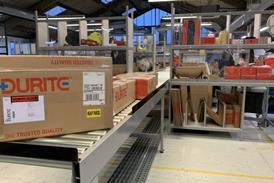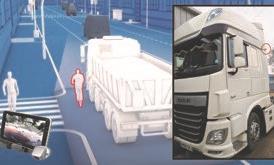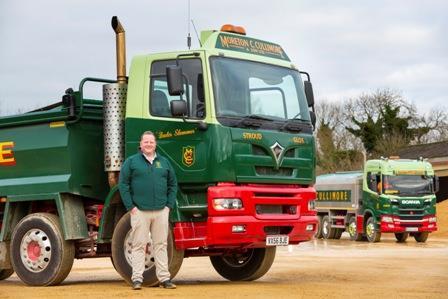
Formed in Whitminster in 1927 as Moreton C Cullimore, the Cullimore Group’s two-tone green trucks have been a familiar sight on Gloucester’s roads for over 90 years.
The current MD Moreton Cullimore – who shares the same first name as his late grandfather and founder of the business – has gradually taken over the running of the family firm from his father and chairman Roger Cullimore as the latter’s health begins to deteriorate.
A man of many parts, Moreton Cullimore has a BA (Hons) in business and management from Sheffield Hallam University and a masters in sports development from the University of Gloucestershire. A keen sportsman he has played and coached rugby union and takes a thoughtful approach to the future of a family business that started out in agricultural transport but is now better known for its sand and gravel extraction and delivery operations.
Although Cullimore is still a young man with no children as yet, he is already thinking about how to leave a lasting environmental legacy as well as a thriving business for future generations.
The Cullimore family have been farming in and round Gloucester for over 400 years and started moving hay and straw with horse-drawn carts. But the haulage business really started in 1927 when Moreton snr bought a Ford Model T with a hand-wound tipper body to take milk, produce and animals to market.
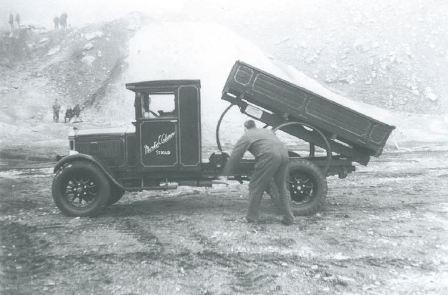
This decision to pioneer motorised transport in the area paid off and within 10 years the fleet had grown to 10 trucks.
Some of the land the family owned turned out to have large reserves of sand and gravel and, as road building and other infrastructure projects took off between the two world wars, the Cullimores began quarrying. They later added a concrete business and today the group spans farming, transport, sand and gravel, ready-mixed concrete and HGV servicing and annual testing.
Today, Moreton jnr takes his responsibilities to the family name very seriously.
“I'm very conscious that I'm the third generation,” he says. “I grew up with everyone saying ‘it always goes wrong in the third generation’. I want to give my dad confidence that we're still battling, we're still trying to push. I think his biggest worry as I came into the businesses was that it wasn't how he wanted to hand it over.
“He wanted to present me this pre-packed business where I would never have to do too much and it would just be easy. He's always worried that what he's left is actually far more difficult now than it ever was in his time.”
Economic uncertainty following the Brexit referendum in 2016 has given anyone trying to make business decisions a real headache.
“We've got quarries, we’ve got concrete and we've got general haulage and workshop services,” says Cullimore. “For us it's not quite like the recession in the fact that in the recession we definitely saw 30% less of everything. But it can be volatile with people like house builders for example saying ‘we're not going into phase two because phase one is only 60% sold and we'd normally expect it to be 98% sold by now’.
“Houses and all those things that we consume - the need is still there. But people don't want to commit to a 35-year mortgage when they don't know what the future holds.”
Cullimore didn’t come straight into the family business when he graduated, admitting his first love was sport rather than aggregates or haulage.
“The first couple of times I worked here, I didn't really enjoy it. It didn't fulfil me,” he admits. “Dad's an only child and I'm an only child, and maybe it was unavoidable in the end, but I tried other things first.
“It was just one of those things that dad was getting to an age where he was less understanding of planning committees and county councils and bureaucracy. It was a different language to him because he was very much brought up in that old school where if I tell you I'm going to do something, I'm a man of my word.”
Sergeant majors
Although there are no other Cullimores in the business, the MD runs it like a family firm with a small close-knit management team.
“I try and have a very flat hierarchical organisation,” he says. “I affectionately call them my sergeant majors. We just work as a collective that is based on trust and faith in people and working together. We work as a different sort of family.”
Cullimore started out working at the family firm during his summer holidays from university.
“My first degree was in business because I didn’t know what else to do so it was the obvious and most flexible choice,” he says. “When I did my post-graduate MA, I got quite involved in sport. I was always able to play rugby as I’m quite a sizable lump and I enjoyed sports. I did some work for Sport England and UK Sports, a high-level government-funded agency, working mainly in elite sport.
“I was in and out of here as well. It was an easy summer job when I was off uni and I've done everything from shovel concrete to drive a truck. But I found it really difficult to work with dad. We both wanted to get the same end result, but we had different ways of doing it.
“I found that really frustrating and a compliment to my dad is that he was always able to flip between being a businessman and a dad. If we had a debate, he'd be able to flip straight into his role as dad, whereas there'd still be steam coming out of my ears.”
Sports fan
As a result Cullimore initially focused on sports, especially rugby coaching, but he realised it was never going to be a full-time career.
“It was always six, seven, eight months work, then I was left with several months of, ‘what am I going to do now?’ he says. “I was also traveling, living out of the boot of my car which was great fun in your early 20s but not so much as I got older.
“It also meant I couldn't commit to my first love which was playing rugby because I was always somewhere else. So I had to come up with a plan with dad of how I was going to come into the business. Because I had the name, people in the business looked to me to make those decisions and take that responsibility, but I couldn't really do that because dad was here.
“That was frustrating but, in a positive light, at the time I was still quite young. I was thinking, ‘I'm 24 or 25 and I'm a man’ but looking back at it now I'm glad that it paused me.
“At the same time I wanted to push things to the next stage, the modern stage, and there was all sorts of things that needed doing within the business. This place [the head office at Netherhills opened in 2012] didn't exist. We had offices everywhere and internal mail. We had no website.
“We were very old school which was what a lot of people loved and why they did business with us - we had that trustworthy family name.”
Trying to modernise a traditional family firm for today’s complex business environment is a tricky balancing act but a feat Cullimore has achieved.
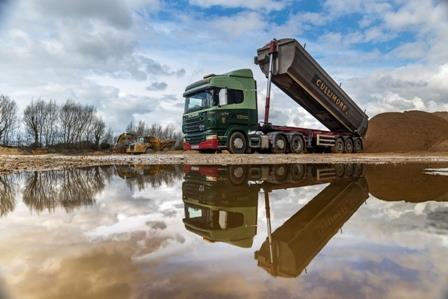
“In the late 1990s health and safety legislation changed the whole game,” he says. “A lot of people had worked for us for a long time but they were all my father's generation. They were very hardworking individuals but they were all looking to me saying, ‘right Moreton, we know we got to do this but we don't know how. You're the one that's been to uni, show us how to work this computer’. They were interesting times but we got there.”
All the shares in the business are held within the Cullimore family and the long-term ownership structure is already on the radar.
“I turned 40 last summer and it's one of those questions that you start asking yourself,” Cullimore says. “In terms of the quarrying our industry is changing. Society and environmental concerns are changing and in 10 years' time we're going to be in a very different place than we are now.
“We're still very old school in the fact that everything that you see is bought and paid for. We own it, we don't lease it and we don't borrow. If we have to buy a few extra trucks we might use finance from the bank, but it's paid off in two years and then it's ours.
“In terms of the land bank we own for quarrying, we have about 10 years of minerals available to us. In the last three or four years I've been trying to find more minerals for the business, which is difficult without moving out of this region and I'm not sure that for a company this size that's what we want to do.”
Balancing act
Reusing former quarries when extraction has finished is possible but the need to generate revenue and meet environmental concerns is yet another difficult balancing act.
Options include allowing the quarry to fill with water to create a wildlife habitat or filling the pit with inert waste such as building rubble and return the land to arable farming. One former quarry is however being converted into a wake-boarding centre, with overhead cables to pull water skiers around a man-made lake.
“We're using the former quarries for different things, whether it be ecological sites or nature reserves, but also this cable ski centre,” says Cullimore. “It'll be the first purpose-built cable ski wake-boarding facility.
“Normally when people have a lake they plonk a cable ski on it. We've designed the lake, how it's formed, how many corners it has, how straight it is, all those things, particularly for this sport. We're going to hopefully bring some other leisure facilities on site for that too.
“Over the next year or two will be the time for me to make up my mind up on that sort of thing. Unless we find another significant mineral reserve, then the shape of that part of our business will change and that will inevitably have an effect on whether we still have any concrete vehicles or not.”
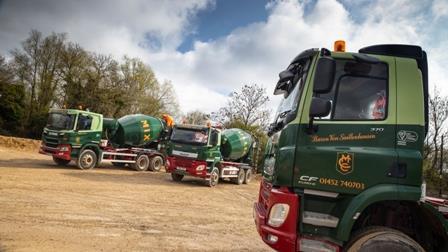
One potential replacement revenue stream is to further develop the Moreton C Cullimore haulage business.
“We've got a new transport team here, and we're trying to push and re-engage on general haulage,” says Cullimore. “The next five years will be key for us in terms of deciding what our future is about.”
Across its farming and quarrying operations Cullimore Group owns nearly 5,000 acres of land in Gloucestershire, Worcestershire and Wiltshire.
“Some of it, through the planning system, is earmarked for biodiversity,” says Cullimore. “The Mineral Products Association talks about ‘natural capital’ so the land has a value for other things. Some of it will be leisure, some of it will be farming and so it will still have a value. When you put something to biodiversity, you're not necessarily seeing a commercial value. But I think that will change because there are more people wanting to understand nature and see it.
“Potentially there is that risk that you have this biodiversity site, which is great to walk around but we've got to cut the hedges and mow the grass and make sure everything’s alright, and that costs. But that's all part of the balancing act and the longer-term headaches that I have to deal with away from the rest of the team here, who are trying to sell the gravel or the haulage or whatever.”
At present the ready-mix concrete business has two plants served by 15 concrete mixers, employs 20 people and turns over around £5m a year. The haulage business runs 60 vehicles each with a largely dedicated driver and brings in around £6m. The aggregates operation is a similar size to transport while farming is the smallest of the four divisions in terms of staffing and revenue.
Farming for food
Farming however is something that Cullimore is taking a growing interest in.
“One of my escapisms is cooking so I thought ‘wouldn't it be nice to grow my own pork as well so let's get some pigs!’ So now we are into that and we're selling sausages and other products. As if I wasn't busy enough already!
“I've tried to push the farming a bit more just because I find it fun and I am keen on the UK being more self-sufficient after Brexit. I like the idea of feeding people and that I know where that animal has grown up, the life it's led and the diet that it's had. We try to be free range and as natural as possible. We talk about it a lot even though it's the smallest part of what we do.”
Family values
Growing the transport side will also not be at the expense of the Cullimore family values.
“It's one of the reasons why I'm proud of what we do and the image we present,” Cullimore says. “We try to make sure our trucks, even at this time of year, [in November when our interview takes place] are always sparkly clean.
“We run everything to a good standard. Our reputation and the way we interact with our customers will always be paramount to what we do rather than volume and turnover. You can go and buy turnover but is it sustainable?
“What I needed to do was ensure the sustainability of this business in the first 10 to 15 years of my career. The next 10 to 15 years will be saying, ‘this is what we created. This is the positive effect we had on the area’.”
Transport fleet
The transport fleet splits its work between carrying products for other parts of the group and external customers.
“We have general haulage where we're moving product for other people,” says Cullimore. “We're moving flour, we're moving furniture for all those well-known furniture companies and we're doing all sorts of general haulage. We moved all the catering equipment to the Ryder Cup last summer and we service the racecourses in the horse racing season.
“Our haulage company is moving our aggregate, which includes taking material away for us to recycle to create secondary recycled aggregate. It's a real combination. We also have our own workshops employing 10 mechanics where around 50% of their work is for external customers as well as maintaining our own fleet.
“We have a relationship with an engineering firm that has just bought out one of our mixer providers, which we also put on our concrete trucks, and we're now doing warranty work for them as one of their authorised repair facilities. Lots of fingers in different pies, so to speak.”
One way Cullimore recruits and retains the best drivers is to allow them to “own” their truck.
“Generally, we like one driver in one truck so they look after it,” he says. “We own all our trucks for their working lives and we've still got one or two Fodens on the road.
“One of our drivers Brian has worked for us since 1974 and his 2004 Foden has done nearly 1.5m kms. He's had that from start to finish. He's been offered God knows how many new trucks, and he's said ‘no’. We've just managed to crowbar him into something else because his 04 plate had quite a major failure and we just thought ‘this isn't going to be properly fixable’.
“It's quite an old school way of doing things but the fact is people are employed as a driver and if we need them to drive another truck on another day then that’s what happens. We have to also remind them that if their truck’s not working today that doesn't mean that you can sit and just wait. They might have to jump in something else, which unfortunately sometimes isn't popular because they get used to what they like and they make their cab their own.
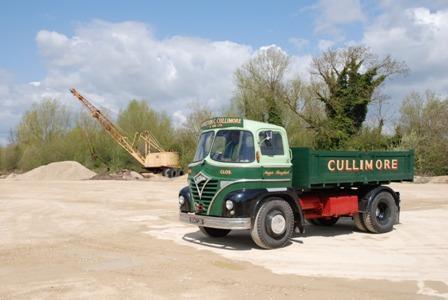
“It goes on merit who gets a new truck. If people have had a bad year and not looked after things, they don't get a new one. We're very proud of the trucks and we want to inspire that culture of looking after the vehicles and being courteous to the customer.”
Trying to stick to a one driver, one truck policy could damage productivity as each vehicle can only be used on a single shift, but in most parts of the business that isn’t an issue.
“On the quarry side they can only open at certain times of day. Generally, our planning permissions will say 6am or 7am to 6pm or 7pm, and our aggregate vehicles are going to building sites, housing developments, construction sites etc which will generally have the same restrictions. Tarmac trucks with the insulated bodies, yes we can double shift those, but we’ve only got a few.
“Obviously the general haulage can be going any time of day. But the bulk of our fleet, the concrete mixers, the tippers and the construction vehicles going in and out of quarries, are limited to those hours of working. It's about working them as efficiently - and legally of course - as possible for that small period.”
The tipper fleet is a mixed bag of four-, six- and eight-wheelers – some with grabs - plus artics and Cullimore is dipping his toe into other bulk transport.
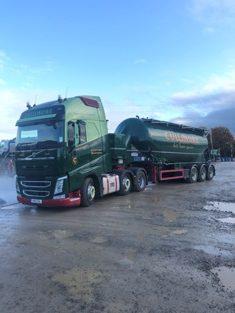
“We've got bulk powder and liquid tanks,” he says. “We've moved cider and now we're moving our cement powder ourselves. We'll try anything. If we think we can make a quid out of it, we'll give it a go.”
The haulage business is also adding rigid curtainsiders to its 11 trailers as it moves more furniture.
“In the last 18 months we've built a new transport department which has allowed us to ask more questions and do things slightly differently,” says Cullimore. “Generally they're artic curtainsiders and we also have flatbeds, stepframes and low loaders.
“Some of our older truck drivers have retired which means some of the older lorries are now coming off. I've had to buy quite a few tippers this year which has pulled the budget in one direction. Next year, I'll have more opportunities to look at rigid curtainsiders and we will need another couple of tractor units as well. Also, I'll need some more big yellow stuff for the quarries. Those get expensive.
“I have just bought a refrigerated rigid so we can move some of our own farm produce around and we bought a skip lorry because we have a lot of skips on our own sites and customer were saying ‘you can take the rubble away and can you leave us a skip behind?’”
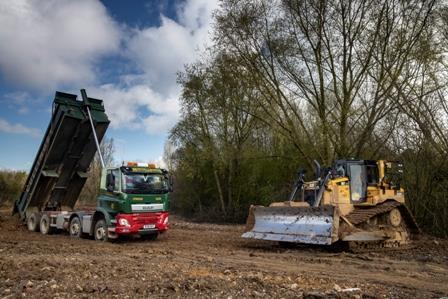
With the pallet networks always looking for strong regional hauliers, is Cullimore tempted to join one?
“Again, it’s a question we are asking ourselves now with the new team who have had experience with that,” he says. “We have always had enough work and there was a little bit of fear of getting involved in that in terms of ‘can we make that work for us’ because we're not a company that says ‘yes, we can do something’ and then lets someone down. We have to be masters of our own destiny. We can expand in other areas without having to rely on a pallet network and we're creating some interesting relationships but never say never.
“At the moment we're definitely in the trial phase with transport and actually it’s quite energising. We'll have a little nibble of this and a little nibble of that to see how it goes. We're doing bits of what we have always just allowed others to do and giving that a go. We're trying, not just doing what we have always done.”
Apart from expanding its range of services, Cullimore could extend its territory beyond Gloucestershire and Worcestershire to pick up more work with the national housebuilders.
“Our territory is already quite reasonable because we have sites between Tewkesbury and Swindon,” he says. “We're quite close to west Oxfordshire and we do a bit towards Hampshire. Our zone is anywhere from Bristol to Oxford to Redditch.
“In that triangle we serve the big national builders - that's the bulk of our work but the margins are very thin. The local builders give a little bit more margin maybe because of the sort of quantities they're taking and we're still cheaper than their other options.”
While the UK needs more houses, creaking infrastructure and nimbyism is limiting volumes.
“All the statistics, whatever government is in power, say that the houses need to be built,” says Cullimore. “The problem we've got is that we've built as much as we can in the cities and lot of the easier places to build are around the smaller towns and villages.

"But people like the villages the size they are. A developer comes along and says ‘I need to build 5,000 homes here’ and people don't like it.
“Everybody wants more homes so their sons and daughters can be first-time buyers. At the same time they want them to be somewhere else. Swindon has slowed down after being heralded as the fastest-growing town in the 1990s. The Cotswolds is a nice place to live but we have many areas of outstanding natural beauty and so development has to be sympathetic to that.”
The length of time Cullimore runs it trucks means the fleet is now biased towards Euro-6 with some Euro-5 and one or two Euro-4s remaining.
“Generally we buy six or seven trucks every year. We've bought probably around 15 trucks this year, mainly rigid tippers and a couple of cement mixers, to avoid possible tariffs after October 31,” he says. “The last two years we've significantly stepped forward and I would say that in 2020 we will be predominantly Euro-6.”
Payload king
With payload king, particularly in the aggregates business, the choice of truck is as dependent on its weight as fuel economy.
“We are always conscious of chassis weights, which is why we always had the Fodens with their rubber suspension. They were a bit lighter and more reliable and they didn't make the horrendous noise that the old leaf springs used to make,” says Cullimore. “We went through a period of buying Scanias because, generally, their chassis were lighter for the aggregates and concrete mixers.
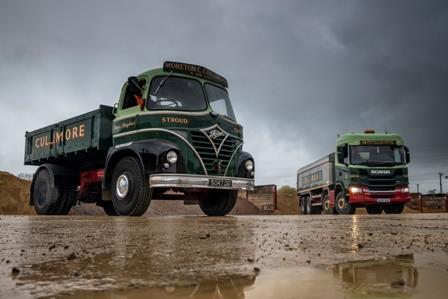
"Then we had a period with DAF because the local dealer really picked up its game and the DAF product made a significant step forward.
“We've always wanted trucks built in Britain, but we don't have that luxury any more. The DAF product has got one foot in that camp so we had DAF for quite a while and then we found that the Scania was performing just a little better. We have flirted occasionally with other makes; Volvo in the last 18 months became more interested in us as a business.
“We always found the Volvo the most expensive vehicle, but they've tried harder with us and we have three or four Volvos coming in. We've already got one FH tractor unit on the road.
“It will be interesting to see how these Volvos go and whether they offer us better fuel efficiency. A lot of our trucks, even the Scanias, now are fully automatic. On the Scanias, we're speccing automatics but there's still a clutch pedal because when you're off road, it's helpful on hill starts. We're in a county of valleys so it's about what's right for us.”
Crazy situation
Cullimore has made efforts to recruit and train young drivers but has had difficulties with insurers.
“It was difficult to get young drivers covered,” he says. “We were faced with this crazy situation where I could employ a 27-year-old who had passed his HGV test two months ago, but I couldn't employ a 23-year-old who had had his licence two years.
“We've got a lot of fathers, sons, husbands and wives working for us. We do have that family feel inside and out and we had a young 18-year-old lad working for us in the bagging plant but his dad was a truck driver. He said ‘when I'm 21, I'm going to get my HGV licence. I want to drive a truck like my dad’. He got his HGV licence but I couldn't get him on the insurance. They said ‘he can drive a truck, but it's got to be one of your little ones’. I said ‘that makes sense, give him some experience’ but then they said ‘he's got to have a chaperone’.
“That was OK, as most of our new drivers will go out with an experienced driver for a couple of days anyway so they know how we like people to drive for the business. They said, ‘no, he'll need to be chaperoned for at least six months’.
"Touch wood we haven’t suffered with recruiting drivers too badly because of the image of our vehicles and the reputation we have. They know if there's a problem with the vehicle, it gets serviced on-site by our staff, we've always been green on our operator's licence and we never operate illegally or ask anyone to run overloaded.
“Dare I say, people have aspired to drive here. Drivers working here for 30 or 40 years knew my father and some of them even knew my grandfather, so it's not been too much of a problem.”
Wage increases
That is not to say Cullimore has been able to let driver pay fall behind and the company has increased wages 3% or 4% every year. “It's always been above inflation,” says Cullimore. “That's something that this company is trying to deliver anyway. And there are other things that a company like us offer in terms of being supportive of family life.
“I don't, for one minute, ever argue against the fact that a good driver is worth more than they get paid and should be paid more. The problem is that the margins just aren't there to support that.”
Cullimore’s is a familiar story of rising costs but stagnating rates.
“For gravel, we're still charging similar rates as we charged 10 years ago,” he says. “Everyone that supplies me has had 7% increases or more, year on year, for at least the last five or six years. Therefore, our overheads have increased exponentially, but for our products, the sand and gravel and the haulage, the prices we're quoting are still the same.
“It's a contracting industry and, if we're not careful and if we don't get the correct attitude in government, then we could be in trouble. That will have very big ramifications.”
Bringing in the new blood
While Cullimore is a long way from the logistics hotspots of London and the Midlands, recruiting the best talent can still be a challenge.
“People don't wake up when they're 18 or 19 and say ‘what industry am I going to go work in? I know, trucks and quarries’,” he says. “It just doesn't happen. People want to be accountants, solicitors or whatever because it makes more money and those services are always going to be needed.
“It's difficult attracting people. From my own experience, when I was 18 or 19, did I want to come here? Would I have said hand on heart that when I was going to wake up and be 40 years old and be doing what I'm doing now? I would have said ‘no’.”
Other family hauliers have gone down the route of bringing in professional management with the view to possibly handing over the reins to them rather than selling up to an external buyer.
“The problem for me is that I’m an only child,” says Cullimore. “I'm not a control freak but I like to be involved in everything. I like to know what's going on. I'm pretty sure that everyone here would say I want to talk about everything but not in an oppressive way.
“That's why we retain a lot of staff here. We're not a company with a high labour turnover. When I came into the business I was blessed with people that had been here 30 or 40 years. We've still got a truck driver out there whose 74. He's worked for this business longer than I've been alive. The lady in accounts has seen me grow up. She's been here 40 years.
“But in the last year or so I’ve been having conversations around maybe I do need a non-exec director. You'll have to ask me that question again sometime in the future. At the moment, it's business as usual and we've got at least 10 to 15 years graft in front of us.
“There are certain things I want to achieve. I grew up with everyone outside the family telling me of how easy my life would be and how I would never have to work. So I've still got to prove a lot of people wrong.”
Taking a long look at alternative fuels
As well as running his business Cullimore is a director of the RHA and takes a keen interest in the big policy issues of the day, including cutting carbon emissions. He is sceptical about recent “improvements” in trucks which have added weight and so increased road mileage.
“One of the key emissions we're trying to reduce is the noxious gases which are dangerous to breathe,” he argues. “It's not reducing the CO2 which is what we should be stopping. We are just making false economies here. I see an aggregate truck that used to carry 22 tonnes of gravel now carrying 18 tonnes. Where's the benefit in that? We're just burning more diesel. We go about things in quite a peculiar way.”
Like many in the HGV sector Cullimore remains dubious about the practicality and affordability of electric trucks.
“Maybe after five or 10 years, the volumes and the economies of scale may move on so much that it will change,” he says. “You've got to be a pretty big, broad shouldered business to weather that lack of profitability.
“In my role with the RHA, you ask yourself, ‘should we be looking at biofuels and alternative fuels’ but how do you make that work?
“It's certainly something I'm going to look at with the tipper portion of our fleet. Because they mostly come home every night, so we're not so reliant on the infrastructure being there. We store diesel on site and if we could find something that I could make a reasonable portion of my fleet run on then the potential for being caught out is reduced.”
What’s in a name?
Like many family hauliers, Moreton C Cullimore’s fleet was commandeered for the Second World War, and after hostilities ended Moreton snr had to go and collect his vehicles. This partly explains the dark green livery – paint was scarce in the 1940s so many trucks just kept their military olive drab colours.
It also explains why almost all Cullimore trucks are named after characters in Charles Dickens’ novels.
Cullimore recounts: “They told my family that when the war ended they should turn up at the airfields and pick the vehicles that were yours. But obviously there were no registration papers so people were just picking the ones that were in the best nick. It was whoever got there first got the best.
“My grandfather wrote these names on the trucks in places that were not immediately obvious so that he could go and see which were his. Later he stopped naming his vehicles but when my father joined the business he said ‘let's reintroduce it’. So he started doing that again, and his view was that, in Charles Dickens’ books, right always prevailed in the end. That's why each truck bar one is named after a Dickens character. There's a romanticism about it in the background.”
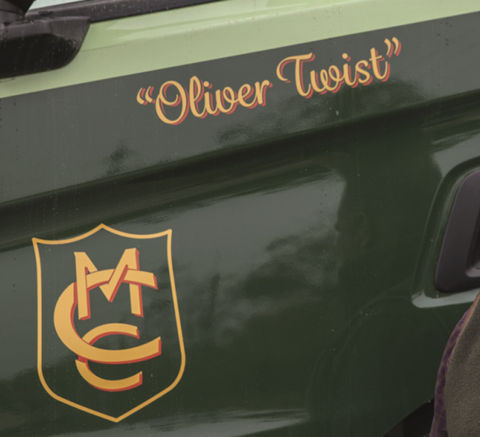
One truck however bears the name Roger Cullimore as a tribute to Moreton’s father and the role he played in building the business.
“Thirteen years ago, when I became a director, I named one of our, at the time, new tractor units after my father because it was the beginning of the transition of me taking over officially from him, at least on a day to day basis,” says Cullimore. “Dad stayed in the business for a bit longer after that but it was the start of the handover.
“I'm not that nostalgic as people will tell you but at the same time as you get older, you're glad you did some things. Dad got his name one of the trucks and it's still there. I'm thinking maybe at the 95th anniversary I'd like to name two tractors after my grandfather and my father.”

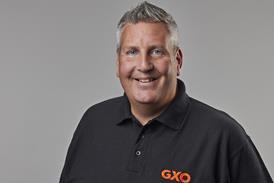
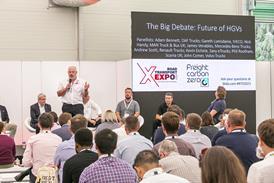
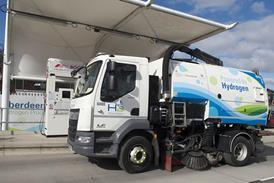


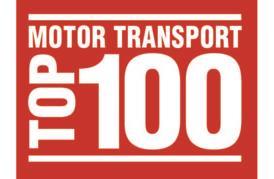


![Mercedes-Benz_eActros_600_(1)[1]](jpg/17820_mercedesbenz_eactros_600_11_978080.jpg)

